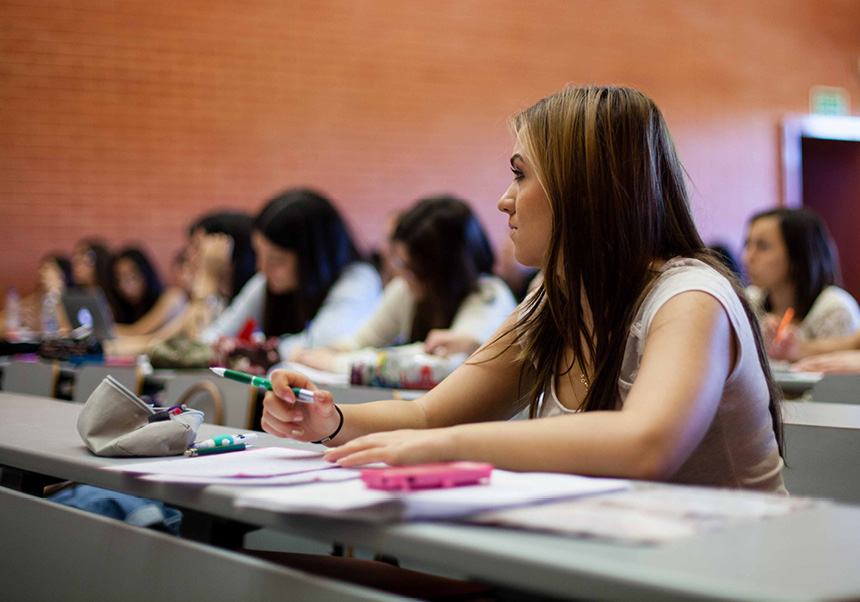The major part of the students evaluates the university experience positively, according the report ‘Via Universitària de la Xarxa Vives’
- Press Office
- May 15th, 2019

The Xarxa Vives d’Universitats has published the results of the report Via Universitària: Accés, condicions d’aprenentatge, expectatives i retorns dels estudis universitaris (2017-2019), in which more than 20 more than 40,000 students from 20 different universities of the Valencian Countries, Catalonia, Balear Islands and Andorra. The study analyses the students’ living standards, the way they study, their connection with university, their cultural habits, the economic conditioners, as well as their expectations, values and believings regarding higher education.
Via Universitaria coincides with the results of the report Eurostudent, which gathers the same information but regarding 28 European countries.
Antonio Ariño, vice-principal for Culture of the Universitat de València and a member of the scientific committee, which elaborates the report participated in the presentation of the document. Ramón Llopis is also a member of the committee and he is lecturer in Sociology and Social Anthropology of the Universitat de València.
Six in ten students are satisfied with the experience at the univeristy, which is evaluated with ‘enthusiasm’ and/or ‘pleasure’. The expectations of future are more optimistic today than they were three years ago, when the first reports and surveys of Via Universitària. Therefore, the 36% trusts that studies will allow them to have a high-status socially, while in 2016 only the 25% believed so. The major part (54%) also believes that what they have studied will allow them to have good incomes; in 2016 only the 40% believed so. Moreover, eight in ten students believe that studies will be useful to be cultured and to find an interesting position and seven in ten also considers that they will allow them to contribute to the bettering of society and to find a better position or related to their studies. The major part (60%) is considerably integrated into university routine and thinks that they are prepared to enter in the labour market thanks to the university (68%).
The institutional implication of students is moderated. Two in ten degree students have participated in any of the parts of university managing, university assembly or association. However, participation in culture and sports is reduced, since only three in ten shows interest.
Antonio Ariño highlights the social perspective of the work which has been carried out, in particular, equity, diversity and quality. The report shows thay the main social status in university is the upper class: 55% of the degrees and 58% of the master’s degrees. In contrast, the lower social status is the least representative in the university in both cases: it involves only the 11% of the students.
Regarding gender, women occupy a major percentatge in the university than men (62%). However, their presence in degrees such as Engineering (32%) and mixes degrees (44,6) is minoritary. Moreover, the study Via Universitària shows that degrees repeat domestic tasks determined by gender. Women focus on areas of health and care, while men focus on those degrees which are related with power and decision-making.
The results of the report of the Xarxa Vives also are an evidence of the efforts of female students when complying with the academic exigences are considerably higher, in particular, in those highly-male degrees, where they are only a few. They are more disciplined and ongoing when studying. The number of women shows their efforts when studying (more than 40 hours per week) are harder than the men’s effort: 40% in front of 34%. Women dedicate more time attending classes and studying, apart from taking care of others, household and transport tasks, while men focus on well-paid work, hobbies and social life.
In addition, the more older, the more difficulties the women have when studying, because the family households affects them considerably more and they spend less time socialising than men. In fact, women dedicate two hours per week less in social activities than men.
The main point of access to university continues to be the traditional way
The vast majority of students (82%) enter university through the traditional route, i.e. through a university entrance exam, without delay or interruption in study. And only 1 in 10 has access through alternative channels, such as vocational education (an access route that has been reduced by 7 points in three years).
Interruptions in studies are caused by social, economic and labour conditioning factors. The children of foreigners and members of families with a low educational level are more vulnerable to the delay in attaining university studies. Also those who are older, those who enter university with low grades and those who study in distance learning modality, as well as students of Engineering, Architecture or Experimental Sciences.
Family support is essential to be able to study at the university
Parents are the main financiers of studies, both in the degrees (58%) and in the master's degrees (43%). In fact, for 25% of undergraduate students, family income is the only source of funding with which to meet the costs of university studies. Scholarships are the second most important source of income, but 6 out of 10 students declare that they aren’t fit for them.
Income from work during the course or holidays is the third source of funding. More than half of undergraduates (52%) combine work and study, although the percentage of this group has fallen by 7% since 2016. In the case of master's students, 36% are full-time students.
6 out of 10 grade students still live with their parents
63% of undergraduate students live in the family home. Of the emancipated students (35%), those of more well-off origin have access to university residences in a greater proportion, and those of less favoured origin to rents shared with other students. Taking into account the results of Eurostudent 2018, the European average of students living in the family home stands at 36%. Thus, we would find ourselves in the situation of Albania and Croatia (51%), Georgia (65%) and Italy (69%) and in the opposite situation to that of the majority of countries included in the European survey, in which the majority of students live outside the parents' home. In Finland 4% of students live with their parents, in Denmark 8% and in Norway 9%.
International mobility, a pending challenge
Only 8% of university students have gone on international mobility, although 37% plan to do so. For 9 out of 10, financial difficulties are a major or fairly major barrier to studying abroad.
High social class students have twice as much international mobility (10%) as low social class students (4.7%). The median social class is also lower; only 6.3% of students study abroad. The international stay is mainly financed by parents (63%), scholarships, grants and loans (19%) and self-financing (16%).
Via Universitaria is one of the core projects of the student programme developed by the Vives Network and occupies a prominent place among the 150 actions of the institution's annual action plan. The first edition of the survey, which was promoted with the Jaume Bofill Foundation, was presented in 2016. This second edition has had the collaboration of the Catalonia Government, the Agency for the Quality of the University System of Catalonia, the Agency for the Quality of Higher Education of Andorra and la Caixa.
Further information
More information:
File in: Estudis
















